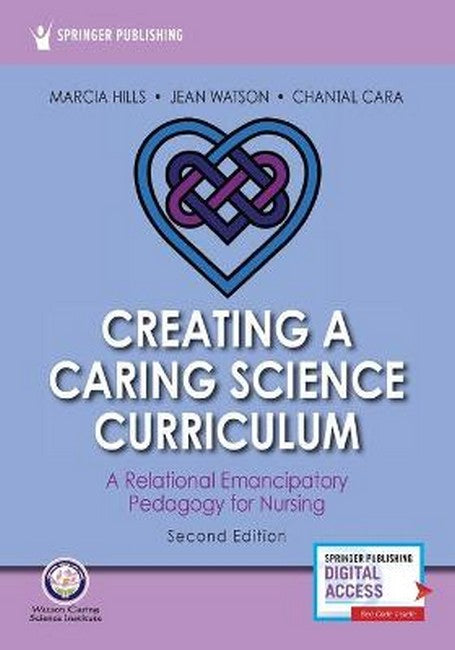Marcia Hills, RN, PhD, FAAN, FCAN, is Professor, School of Nursing, Faculty of Human and Social Development, University of Victoria, British Columbia, Canada. Dr. Hills is a distinguished scholar of Caring Science, faculty associate, inaugural chair of the Faculty Executive and Faculty Council, and academic lead of the doctoral program at the Watson Caring Science Institute (WSCI). She is the also the founder and current president of the Global Alliance for Human Caring Education. Dr. Hills is the coauthor of An Educator's Guide to Humanizing Nursing Education: Grounded in Caring Science. As a visiting scholar and a World Health Organization (WHO) fellow, she has worked and studied in Australia, England, and at the National School of Public Health in Rio de Janeiro, Brazil. Dr. Hills has consulted extensively in the United States, United Kingdom, New Zealand, Australia, Trinidad and Tobago, Kenya, Brazil, Chile, and Canada in the areas of health promotion, primary health care, emancipatory caring curriculum development and pedagogy, women's health, and participatory action research and evaluation. Jean Watson, PhD, RN, AHN-BC, FAAN, LL-AAN, is Distinguished Professor and Dean Emerita, University of Colorado Denver, College of Nursing Anschutz Medical Center campus, where she held the nation's first endowed Chair in Caring Science for 16 years. She is founder of the original Center for Human Caring in Colorado and is a fellow of the American Academy of Nursing; past president of the National League for Nursing; founding member of International Association in Human Caring and International Caritas Consortium. She is founder and director of the non-profit foundation Watson Caring Science Institute. In 2013 Dr. Watson was inducted as a Living Legend by the American Academy of Nursing, its highest honor. She is a widely published author and recipient of many national/international awards and honors, including 15 Honorary Doctoral Degrees, 12 of which are International Honorary Doctorates (Sweden, United Kingdom, Spain, British Columbia and Quebec, Canada, Japan, Turkey, and Peru and Colombia, South America). Dr. Watson's caring philosophy is used to guide transformative models of caring education and professional caring-healing practices for hospitals, nurses and patients alike, in diverse settings worldwide. As author/co-author of over 30 books on caring, her latest books range from empirical measurements and international research on caring, to new postmodern philosophies of caring and healing, philosophy and science of caring and caring science as sacred science, global advance in Caring Literacy. Her books have received the American Journal of Nursing's Book of the Year award and seek to bridge paradigms as well as point toward transformative models for this 21st century. Chantal Cara, RN, PhD, FAAN, FCAN, is Professor, Faculty of Nursing, Universite de Montreal in Quebec, Canada. She is also a researcher at the Montreal's Centre for Interdisciplinary Research in Rehabilitation and at the Quebec Network on Nursing Intervention Research for humanistic practices. She received her Ph.D. in 1997 from the University of Colorado, under the directorship of Dr. Jean Watson. For more than 30 years, she has been actively involved in the advancement of Human Caring in both French and English communities. She is an international renowned scholar for creating and implementing the French Humanistic Model of Nursing Care and the Relational Caring Inquiry research methodology, both used in several countries. Dr. Cara's teaching, research activities, publications and conferences reflect her disciplinary commitment to disseminate internationally her theory-guided research findings aimed at fostering humanistic nursing practices in the clinical, managerial, and educational domains. Dr. Cara has been actively involved for over 20 years as a member of the International Association of Human Caring, where she holds an Editorial Board position on the International Journal for Human Caring and is a current Board Member. In 2016, she was the first to be attributed the title Distinguished Watson Caring Science Scholar by the Watson Caring Science Institute. In 2018, she was the first in Quebec to be inducted Fellow of the American Academy of Nursing. More recently, in 2020, she was invited to become a Charter Fellow of the Canadian Academy of Nursing, representing the French nurses of Canada.
Request Academic Copy
Please copy the ISBN for submitting review copy form
Description
ContributorsForeword Preface Acknowledgments UNIT I. FOUNDATIONS OF A CARING SCIENCE CURRICULUM Chapter 1. Caring Science: Curriculum Revolutions and Detours Along the Way Chapter 2. Caring Science Disciplinary Evolution Chapter 3. Beliefs and Assumptions: The Hidden Drivers of Curriculum Development Chapter 4. A Theoretical/Philosophical Framework for a Caring Science Curriculum UNIT II. A RELATIONAL EMANCIPATORY PEDAGOGY FOR CARING SCIENCE CURRICULA Chapter 5. Emancipatory Pedagogy: The Transformation of Consciousness Through Relational Inquiry Chapter 6. Creating Caring Relationships: Collaboration, Power and Participation Chapter 7. Engaging in Critical Caring Dialogue: Listening, Critical Questioning, and Critical Thinking Chapter 8. Critical Reflection-in-Action (Praxis): Emancipatory Action Chapter 9. Creating a Culture of Caring UNIT III. CREATING A CARING SCIENCE CURRICULUM Chapter 10. Collaborative Caring Science Curriculum Structure and Design: Transcending Reductionistic Models Chapter 11. Creating Canada's First Caring Science Curriculum: The Collaborative Nursing Program of British Columbia Chapter 12. Humanism in the Classroom: 30 Years of Experience With Caring Science Chapter 13. Evolution of a Caring-Based College of Nursing Chapter 14. Creating a Caring Science Curriculum: The Siena Experience Chapter 15. Developing Caring Consciousness in Nurse Leaders Chapter 16. Indigenist Nursing: Caring Keeps Us Close to the Source Chapter 17. Simulation, Narrative Pedagogy, and Caring FidelityTM-The New Reality UNIT IV. BEYOND EVALUATION TO AUTHENTICATION Chapter 18. Connoisseurship: An Alternative Approach to Evaluation UNIT V. ENSURING THE FUTURE OF NURSING: EMBRACING CARING SCIENCE Chapter 19. Reflecting and Revisioning: Bringing the Heart and Mind Together Index

